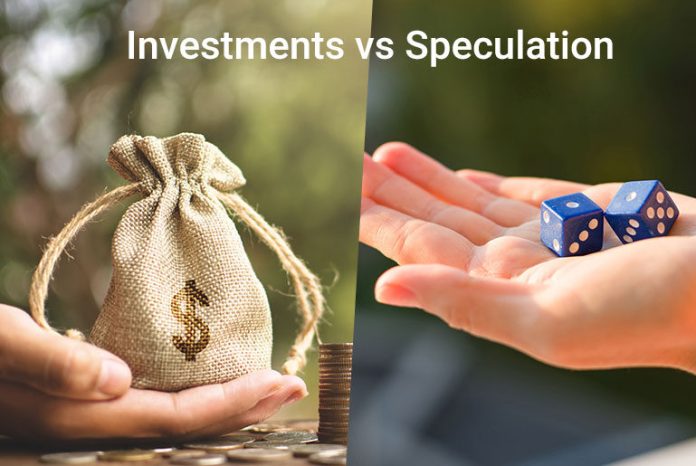Many investors have the goal of gradually increasing their wealth through financial market investments. The ideal way is basing their investment decisions on the likelihood that they will produce steady growth (rather than quickest growth). Contrarily, speculators carefully predict which direction the value of a financial asset will go and then utilize that prediction to inform their investment strategy.
Investing in high-risk speculation frequently has the potential to produce large profits (or losses). Investors who buy and hold typically profit when the value of the stocks they own increases. That’s not always the case, though, as some speculators have profited by anticipating a market decline and selling before it occurs. They might then repurchase the equities at a lesser cost.
Speculation involves higher financial risk, but when it succeeds, it may be quite lucrative. However, all but a handful of the speculative ideas are correct. Investors should keep in mind that trading speculatively in order to make a lot of money quickly has the danger of suffering a capital loss.
Any speculative winnings must be sufficient to offset the likely losses of a high-risk approach because such losses can result in financial catastrophes. Contrastingly, even as they accumulate steady and secure returns, portfolios that consistently earn income can appear somnolent.
While big short-term gains from speculating are possible, long-term investing consistently outperforms it-
Like investors, speculators make investments in the anticipation that they will be able to sell their holdings for a profit. Though a lot of investors deliberately place their money in low-risk ventures with a decent probability of making money, speculators frequently choose chances with higher risk of losing money but higher potential returns.
A speculator believes that the possible gain justifies the risk. Trading in extremely volatile markets is frequently involved in speculating.
Trading on speculation provides benefits and drawbacks for the individual as well as the economy as a whole. Individual investors who engage in speculation invest in high-risk ventures with greater potential for loss of capital than other types of investing. Because of this, many investors may decide that speculating is not a method for investing that is worth the risk. Others might find that the possible rewards outweigh the significant danger of loss.
- NCC And FCCPC Unite To Strengthen Telecom Consumer Protection
- Telecom Operators Generate N5.3 Trillion Revenue In 2023
- Environmental Group Calls For Immediate Action On Oil Leak, Fire Outbreak In Rivers Communities
- Lagos State Vaccinates 3.5 Million Children Against Measles, 20.3 Million Residents For Yellow Fever
- Group Urges FG To Release Funds For Timely Project Completion
In contrast to speculators, who could be more inclined to invest, a start-up, for instance, might find it difficult to find other capital because it has a track record.
In addition, speculators can enhance market Forex liquidity and reduce the bid-ask spread, which helps participants effectively to manage price risk. Through betting against favorable results, speculative short-selling may also rein in rabid bullishness and stop asset price bubbles from forming. Mutual funds and hedge funds frequently speculate in the bond, stock, and foreign exchange markets.
Speculation can also have detrimental effects on the economy. The price of an asset may change only as a result of speculators’ activity and not due to any other market factors. Imagine a group of investors sold all of their shares of a particular stock out of concern that it would shortly decline.
The stock price may decrease if a large enough number of people sold all of their shares at once. The same thing may occur when investors buy; they may cause a bubble and artificially inflate prices.
To sum up
Even though some types of speculation can lead to favorable results, there are many more situations when speculating can seriously harm your financial situation. In order to avoid the dangers, investors should be aware of the high levels of risk involved and seriously consider sticking to a long-term investing plan.
















